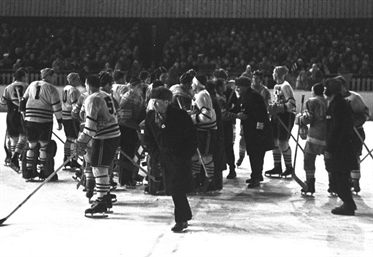Best and worst of Russia
Best and worst of Russia
From 1956’s high to 2010’s low

 Game over! The Soviet Union has defeated Canada 2-0 and secured the gold medal in the 1956 Olympics in Cortina. A new hockey era had started. Photo: Hockey Hall of Fame
Game over! The Soviet Union has defeated Canada 2-0 and secured the gold medal in the 1956 Olympics in Cortina. A new hockey era had started. Photo: Hockey Hall of Fame
In IIHF.com’s list of the top five best and top five worst moments in Russia’s Olympic hockey history, all five of the best ones come from the USSR epoch. Four of the worst are from the post-1991 era. But the one Soviet-era blunder is the biggest one of all.
Getting curious? Let’s look back at the highs and lows of the host nation, which is hoping to win Winter Games gold for the first time since 1992.
THE BEST
1) A Dazzling Debut (1956)
The Soviets won six games and tied one en route to gold at their first IIHF Ice Hockey World Championship in 1954, and they were even better in their Olympic debut two years later in Cortina D’Ampezzo.
Headlined by star forward Vsevolod Bobrov and goalie Nikolai Puchkov, they earned seven straight victories. They beat Canada’s entry, the amateur Kitchener-Waterloo Dutchmen, 2-0 in their final game on February 4. The result confirmed the USSR’s status as the rising superpower in IIHF competition and Canada’s new arch-enemy.
2) Classic Coaching Duo Strikes Gold (1964)
If you believe a “good cop, bad cop” routine is effective in delivering results, Anatoli Tarasov and Arkadi Chernyshev offered a perfect example. They co-coached the Soviet Union to nine straight titles between 1963 and 1971, and also got three straight Olympic gold medals with their highly different personal styles, starting in 1964.
Tarasov was instinctive, innovative, and a taskmaster par excellence. Chernyshev took a more professorial approach, often analyzing games and practices from the stands instead of joining the team at ice level. It worked perfectly at the Winter Games in Innsbruck, Austria. With a tournament-leading 54-10 goal difference, the Soviets capped off their run of seven straight wins by edging Canada 3-2.
3) Kharlamov’s Star Turn (1972)
Playing with right wing Boris Mikhailov and centre Vladimir Petrov, Valeri Kharlamov added to the legend that would ultimately earn him a berth on the IIHF’s Centennial All-Star Team in 2008. Artistic and creative, Kharlamov ruled the scoring derby in Sapporo, Japan, racking up nine goals and six assists in just five games en route to gold.
He would also score the championship-winning goal against Czechoslovakia in 1976. The late left wing was the all-time Olympic leading scorer with 36 points until Teemu Selanne surpassed him in 2010.
4) Defence Spawns Domination (1984)
The Russians simply had to win gold in Sarajevo, Yugoslavia to make up for handing it away to the Americans in the 1980 “Miracle on Ice” in Lake Placid. While current Russian Hockey Federation president and then-Soviet goalie Vladislav Tretiak said later that the team had a hard time relaxing under the circumstances, their defensive effort did him proud in his international swan song.
Tretiak wound up with a 0.67 GAA, as the USSR conceded just one goal in each of its five-round robin games and then blanked Canada 4-0 and Czechoslovakia 2-0 to take the title. It was another feather in the cap for Viktor Tikhonov, international hockey’s winningest coach of all time.
5) Tikhonov’s Best Team Ever? (1988)
When Dave King – a three-time Olympic coach who led Canada to silver in 1992 – asked Tikhonov which team he ever coached was the best, he chose the team that captured gold at the Winter Games in Calgary. It was a triumph the Soviets badly needed after losing both the 1987 IIHF World Championship to Sweden and the 1987 Canada Cup to Canada.
In the final hurrah for the classic “Big Red Machine,” Vladimir Krutov topped the scoring parade with 15 points, followed closely by Igor Larionov and Vyacheslav Fetisov with 13 apiece and Sergei Makarov with 11. The only blemish on their record was a 2-1 loss to Finland, which gave the Nordic underdogs their first Olympic medal ever (silver), but that came after the Soviets had already wrapped up the gold.
THE WORST
1) The Lake Placid Abomination (1980)
While the Russians would acknowledge that losing 4-3 to American college players under coach Herb Brooks was indeed “miraculous,” they wouldn’t appreciate the positive implications of that term for the ignominy that their biggest stars – the same ones who beat the NHL’s best Canadians at the 1979 Challenge Cup and 1981 Canada Cup – suffered at the Lake Placid Olympics
According to Wayne Coffey’s 2004 book The Boys of Winter, there are no visible reminders at the Russian Hockey Federation headquarters in Moscow of what happened on February 22, 1980.
2) Bykov’s Boys Blown Out (2010)
When host Canada and the Russians faced off in the quarter-finals in Vancouver, many said it could go either way. But few foresaw that the Russians would suffer their worst defeat ever in Olympic competition, apart from a 5-0 loss to Finland in 1994. This was certainly the most crushing.
The Canadians neutralized superstar winger Alexander Ovechkin with a line of Rick Nash, Jonathan Toews, and Mike Richards. They led 4-1 after the first period, and when coach Vyacheslav Bykov didn’t make a goaltending change to start the second, they pumped two more past a shaky Yevgeni Nabokov. Ilya Bryzgalov, who finally replaced Nabokov, said Canada attacked like “gorillas coming out of a cage.” It was Canada’s first Olympic win over Russia since 1960.
3) History for All the Wrong Reasons (1994)
In 1994, Russia failed for the first time ever to win a medal in Olympic hockey competition. Its 4-0 loss to Finland in the bronze medal game marked the last time Viktor Tikhonov would ever coach at the Winter Games. His assistant, Igor Dmitriev, said afterwards: “The heaviest punishment for [coaches] is to see the face of the players who lost the tournament, because they trust in us.”
4) Blanked in the Biggest Games (2006)
The Russians were ecstatic when Ovechkin and Alexei Kovalyov scored in a 2-0 quarter-final win over Canada in 2006, dethroning the reigning champs from Salt Lake City. The door to gold appeared to be wide open. But a tight-checking Finnish squad spoiled the party for coach Vladimir Krikunov’s elite talents with a 4-0 semi-final win. Stunned, the Russians had nothing left to give in the bronze medal game, which they lost 3-0 to the Czechs.
5) Too Much Semi-Final Sleeping (2002)
In their two head-to-head encounters in Salt Lake City, Russia and the United States combined for four periods of thrilling hockey. Three of those came in a 2-2 round-robin tie, where Brett Hull notched the equalizer for the Americans with four and a half minutes left. In the semi-final, the Russians came on like gangbusters in the third period, but lost 3-2.
What was the problem? Coach Vyacheslav Fetisov’s squad just didn’t show up to play in the first two periods, getting outshot 20-4 in the opening stanza alone and enabling the Americans to build a 3-0 lead through two. Fetisov expressed unhappiness with the officiating afterwards, but his superstars – including Pavel Bure, Sergei Fedorov, and Alexei Yashin – had only themselves to blame for the result. Russia consoled itself with a 7-2 bronze medal win over Belarus.
Back to Overview











































